#dad Nasus trying his best
Explore tagged Tumblr posts
Text

I've been given a task, and by god I guess I'll do it. This will not be a comprehensive list, simply because there's a lot of Fate media I have not gotten to yet (or haven't watched/played in a long time).
S TIER

Saber (Artoria): Despite her primary route in F/SN being the least developed, Artoria is the GOAT. No matter how many other blonde women with swords Type-Moon continues to spit out, Artoria will always be THE Saber. She's beautiful. She's perfect. I desperately need her outfit.
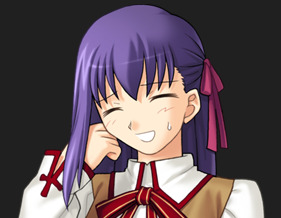
Sakura: She's allowed to do as much murder as she wants. She deserves a little treat.

Rin: The first time she met Saber, she was about to get run through my Excalibur and STILL the first thought she had was, "Goddamn she's hot." Rin is a closeted bisexual disaster and a queen. Her fashion is immaculate. No one could fix her, but honestly it's pointless to try. If you don't love what's wrong with her, you don't deserve her.

Saber (Nero): She's beautiful. She's charming. She's a pansexual theater nerd. She has my favorite Noble Phantasm. Her bridal outfit goes SO hard.
A+ TIER
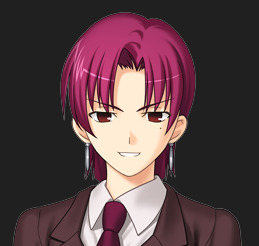
Bazett: She gets a lot of points for her incredible character design, being cool as fuck, and getting a genuinely fantastic character arc in Fate/Hollow Ataraxia. Unfortunately, she loses a point for having 50/50 taste in men. Lancer? Yeah, sure, totally understandable. Respectable, even. Kirei, though? Girl, what the hell is wrong with you?

Rider (Medusa): She doesn't get much to do until Heaven's Feel, but boy does she make up for it once you get there. Has some of the best and most charming scenes in F/HA as well. Is basically Sakura's surrogate hot mom. Takahata is a genius for putting her in glasses, a turtleneck and jeans. I would love to spend an afternoon chilling with her in her little library.

Saber (Mordred): Artoria's angry, punk son. As a character? He rules. Great look, sickass armor, really fun attitude. The main problem with Mordred is how Type-Moon (and by extension, the fanbase) handles his gender situation. Trying to talk with a stranger about Mordred is like navigating a minefield. Will they be chill and understand what's going on, or will they be weirdly insistent about Mordred "definitely" being a girl despite everything he says and does? It's a coinflip, honestly.
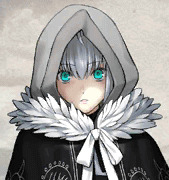
Gray: A precious child. I adore Gray's aesthetic and personality. Her relationship with her adoptive gay dad (Waver) is one of my favorites in the whole franchise. Her scythe is sick as fuck. The only points against her are that it's very difficult to recommend stuff starring her. She's only in one anime (which, while good, is very confusing if you aren't already invested in this franchise). The only other officially translated content starring her are limited-time events in FGO. Some of the Case Files novels have been fan-translated, but not all of them. It's rough out there for Gray fans.
A TIER

Caster (Medea): The second MILF-coded murder-woman on this list. She's a little one-note, comparatively, but that note is played very well. She killed her first, shitty Master and got herself a stoic, noble husband who loves her SO much. I love how much they adore each other. It's so charming. She also tried to put Saber through a corruption arc via magical bondage and a custom-made wedding dress. Was it evil? Oh, extremely. But do I respect the hustle? Absolutely. The scene in F/HA where Sakura asks her for advice is one of the best in the entire fandisc.

Illya: I love how much of a gremlin she is. I love how poignant some of her scenes in F/SN are. I love how F/HA lets her (mostly) be a goofball. Although the first two games largely avoid the ickiness that comes with the territory of "18+ woman who looks like a child for Reason," there are still moments that make me side-eye Nasu, and it really only gets worse post-F/HA. I'm sorry, Illya. That magical girl manga isn't your fault, but if a character has to have a "please just ignore anything starring them after this point" caveat, that's gonna deduct some points.
A- TIER

Caren: A potentially controversial placement. I do appreciate her moxy and how fucked up she is. Big fan of all her outfits. Unfortunately, a lot of her scenes blend together for me and start to feel repetitive. This is likely due to her almost exclusively having scenes with Avenger. She's also the unfortunate recipient of the most off-putting sex scene in the franchise. Yes, even worse than the Rin x Shirou one in UBW. If she got more chances to interact with other people, she'd definitely place higher.

Otoko: I can count the number of scenes she gets in F/HA on one hand, but she makes a hell of an impression. Great design, great attitude. If Nasu wasn't a fucking coward, there'd be a scene where she gets her strap out of storage and annihilates Taiga.
B TIER

Taiga: I'm probably gonna get flak for this, but her humor is kinda hit-or-miss for me. Especially in F/HA. She's mostly fine, and she does have a great design, but the joke sometimes gets old. Also the whole "Jaguar Warrior" thing in FGO is a bad look. You can't be doing that, Taiga.
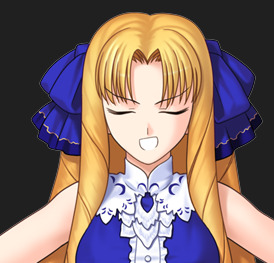
Luvia: The standard ojou-sama archetype. I enjoy her every time she shows up, but there's not much to her. She's at her best when she's a foil for Rin.
C TIER
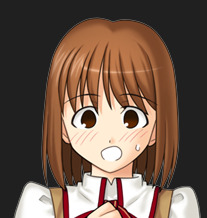


The Trio: I've put these characters together, because that's when they're at their best. On their own? Completely forgettable. Together? Solid supporting, comedic-relief characters. They're totally fine. I will never remember their names.
D TIER

Illya's Maids: I'm not even going to look up their names. I have never been able to remember these characters. Nasu took the concept of "maid that's also a nun" and made it boring. They just get nothing to do. The two of them deserved better.
23 notes
·
View notes
Text
Understanding Beast VII: Olgamarie’s and her family’s Sin in FGO
Note this is speculation meta which might or might not get jossed in the future, or change when I go through another branch. It's to explore what's said in the game, adaptation and other related (Nasu approved) material to speculate the themes of part 2. Working with contrasts with previous plot relevant Beasts, setting aside Tiamat animated parallel (which could get for Beast I in the future when Solomon temple is out as well), Goetia works the best because of the origins:
King Hassan (in disguise) warns in Babylonia through flowery language warns of two evils in particular. One is pity (or compassion), and another, the complementary one, shame (or regret). Beast VII sin hasn't been assigned, however it's very likely it'll be this one. I think I've covered up since the beginning of Lostbelt my suspicion Beast VII was the culprit because this sin was particularly fitting with Lostbelts and Crypters.
Beast I and Beast VII have some sort of connection, to each other. Holmes call Beast I attack the present from the past, while Beast VII from the future. It's the destruction of the past, the end of the future which somehow provokes this.
The Time Temple is compared by Da Vinci with Chaldeas, both as conceptual replicas of something on a smaller scale. Chaldeas is probably connected to Beast VII and the bleaching because it was made to observe the future, 100 years to be precise.
Now, talking about sins seems excessive, but I'm just using some contextual language since we speak of Beasts. Evils of Humanity. Beings who bear their fangs against the Human Order of the present to safeguard the Human Order. Well, of course, we're talking about the more plot-relevant ones and we can ignore Kiara or Kama for this lore definition. That's what I'm sticking with. Given that clarification, we should recap what was Beast I to understand why Animusphere are Beast VII and why Olga in particular, rather than her father (for now?).
Beast I was the consequence of a system designed to protect the Human Order and help humanity evolve. An observation system composed first of Solomon, who died, and then the 72 pillar demons. This birthed humanity incineration in their pride and anguish of humanity perceived meaningless and suffering. It was pity for that history of pain that led to extinguish it fire to use that energy and makeover the species (and the planet) from scratch. It was because they had the authority to do so. They were a system made to evolve humans, and one with human emotion and agency, unlike Solomon who could perform his duty because he had neither of those. Roman, the human born of Solomon's wish for a second life, countered such a statement denying the rights of such authority, returning Solomon's blessings to God, completing that task. Because he believed in many futures chosen by people themselves, and not chosen by him or his replacement. The reason why Goetia became Beast I and not Solomon was because Goetia had freedom to be angry and snap back, but Solomon admitted he didn’t have such freedom, so the potential of that evil was inherent in the system: an observation system to evolve humanity. That’s not necessarily a bad thing, but perhaps it is when it demands it to have the reigns and control of it.
Back to Animuspheres. Why them? Creating Chaldea seems beneficial for humanity. Well, it is... but only if Chaldea is treated like was treated under Romani, Da Vinci and Gordolf: as a group that answers emergencies that endanger the present at the time rather than in potential for a future danger. Let’s remind what Olga said in Fuyuki:
(cutting because image heavy)
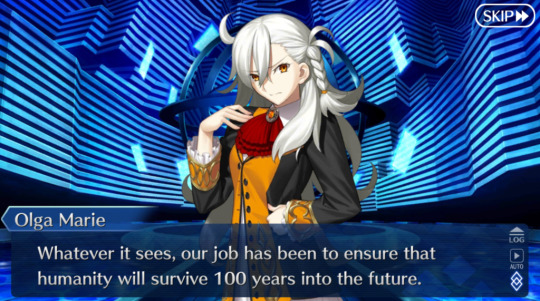
On a first read, it sounds innocent, but actually, is a fairly arrogant claim. The speech beforehand should be revised (in particular with the recontextualization Mortalis Stella gives it having Emiya being angry with Olga and the Animuspheres):
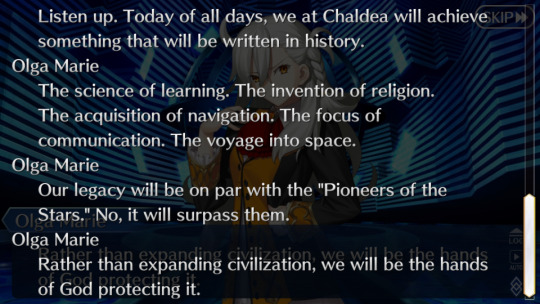
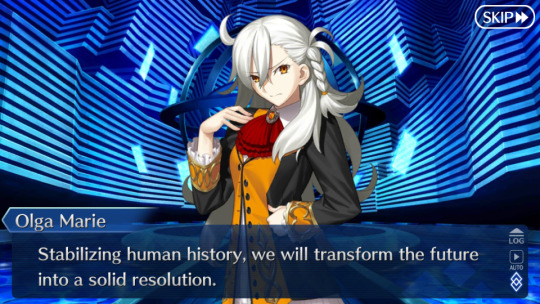
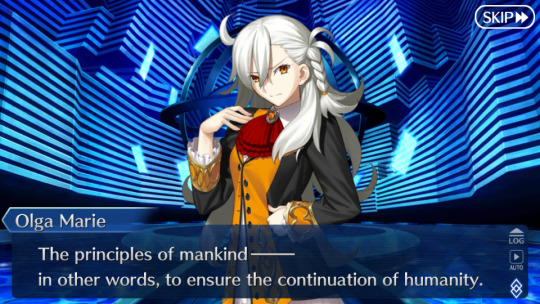
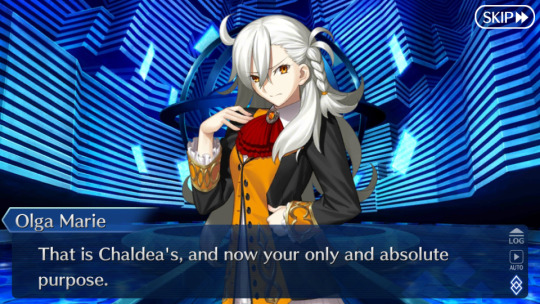
Basically, if Solomon and the 72 demon gods were Observers and Administrators to evolve Humanity (something Roman undid so humanity would be free to choose going their pace). Animuspheres fashioned themselves as Observers who ensure or validate Humanity future. The results of over 2000 years of experimentation. Now here’s the question, if Beast VII is the Beast made of this system, why was Olga, and not her father, the one who transformed? While in the past, I believed Marisbury would be Beast VII, I always have to wonder one thing: what could lead a man as self-assured and pragmatic to experience such shame and regret (if that was the Beast sin as I speculated) so I had to headcanon something like “whatever he saw in the future made him feel ashamed”, but thinking about it, he couldn’t be that for a similar reason Solomon wasn’t Beast I: he didn’t have the mindset for it (in Solomon’s case, it was because he had no freedom to choose to be angry - but this weakness also exists, even in Roman who dislikes watching and making people sad, he just diverted from his potential danger by his personal journey as human). Marisbury’s simply someone who resolutely points a gun at himself and blows his brains out with a smile. He still could have been an evil of Humanity, like Solomon probably was (not the Servant record version), just unhatched because the sin assigned was never nurtured. His daughter on the other hand... Unlike her dad, Olgamarie accomplished nothing, she’s deemed as a failure, no matter how she tries, even less apt for Celestial Bodies Faculty than her father’s star pupil, Kirschtaria Wodime. She even clings to her ‘life’ in Fuyuki because of her regrets, expresses her cries for her own insignificance in her last moments unable to accept it’s over.
There surely are other factors, like humanity torturing her (Specimen E), her death, potentially being an artificial being, or family indoctrination. But it’s still Olgamarie’s choice and her flaws which led to this transformation. The emphasis made on Olgamarie’s choice was present in the Lostroom when Lev asks her what she’ll do and she doesn’t have an answer to him. Her only answer is in the game or in the storyline where she parrots they’ll protect the future:
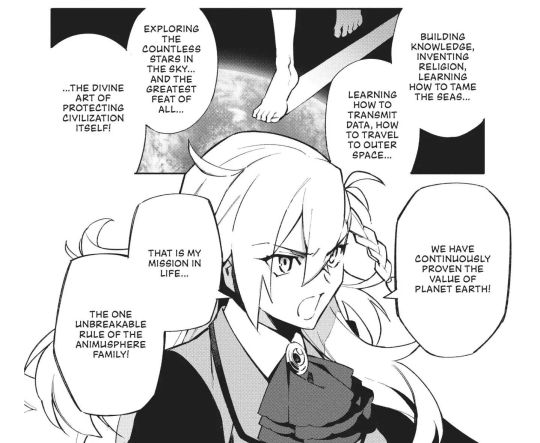
And now we’re back to Melty Blood: Backalley Nightmare. In that story, there's an argument of approaches to how to protect humanity. One is Sion, who abandons the big picture of 'preventing' a crisis and more 'do what little I can do' with the present. This is what Chaldea, the Chaldea after Olgamarie died led by Roman and his successors, has been doing, even in the Lostbelts. They try to protect what they could, and trust for the best. The other is Siamlin, who like Animuspheres did, is trying to observe the future and take measures to prevent it before it happens, no matter what she does, she justifies it as for the sake of the future.
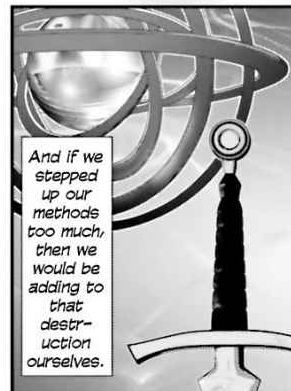
(and there's this warning right here).
Simultaneously there're two Olgamaries. A dead one, presumably from Siamlin’s timeline, is a child ghost with mysterious powers and says this: “The future will not change.” The other Olgamarie is actually from one of Atlas’ simulations but has become a real timeline (due to Ghost Olgamarie’s power). That Olgamarie meets Sion and has a change of heart. This is why I made emphasis on Olgamarie’s choice and agency earlier, because that Olgamarie takes FGO Olgamarie’s proud statements in the beginning about her and Animusphere’s mission and abandons it:
Our job to guarantee the future, but whose future do we guarantee? We say that we're going to ensure the future, but what kind of future do we think is good? We expanded on the land, we built cities, we crossed oceans, we travelled the skies, but for what purpose?
She concludes that, to change the future, working with the little things of the present should be more important. This speech she gives to Flauros before he detonates the bomb, and it changes everything because no bomb goes off. Nobody died. Flauros changed his mind and agreed. While the ending is all poetic and symbolic. The result is Sion winning. And the materialization is what Olga (this Olgamarie) wants, same as Roman, a bright blue future which is the symbolism for “endless possibilities” (also mentioned and reminded in Lostroom by Lev to her). The future can change.
Well, I was lengthy, but I laid out something: Beast VII being Olgamarie, other than whatever tragic thing Nasu will toss to “soften” the blame, makes a lot of sense if it’s the Beast of Shame/Regret who ends the present from the Future. Animusphere (or Animusphere experiment) connected to Chaldeas and filled to the brim with feelings of not being good enough, and who thought needed to ensure humanity’s future. However, I think the one who has to defeat Beast VII is Olgamarie herself too. Because there need to be clear that humanity doesn’t need anyone to validate the future for them and the approach to change what’s the come is more “focusing on what little you can do now” than “obtain a great power to change things” which is what Olgamarie concluded in that manga (ironically FGO Olga strongly preached for latter in her speech; it’s no surprise U Olga exists partly, IMO, due to this). It’s possible that the thematic resolution will be similar, give or add new themes with more packing punch and characters involved.
P.S. Moonlight Lostroom OVA and Mortalis Stella in particular make emphasis that Olgamarie has doubts about her mission, but it seems she sticks with it. But once again, it’s important that these got (belatedly) added to reflect the post Melty Blood manga retcons.
#fate grand order#fgo spoilers#lostroom spoilers#meta#speculation#beast#this doesn't mean u olga doesn't look and act as the opposite of cool and badass
50 notes
·
View notes
Note
16 for all your twst bois
16. If they were arrested with no explanation, what would their friends and family think they had done?
Quintin Blanpine & Seisear Marchare: Their grandfather would definitely be quite miffed about his beloved grandsons being arrested with no explanation, plus he knows all about Quintin since he raised the boy by himself after the kid’s parents died when he was young, and he’s been in Seisear’s life ever since his childhood (until he also ended up practically raising him alongside Quintin after a certain incident). He believes that neither of the two did anything bad but is cordial and polite when inquiring about just why did his grandsons get arrested.
Ophiou Chos Gorgos: His mother would DEFINITELY be upset. She’s protective over her son, especially so after she nearly lost him in the past, and now he gets put in jail for no reason whatsoever? Despite her fury though, she retracts her teeth and anger, even though she has long since lost her eye ability, as she tries to peacefully settle this and get her son out of wrongful imprisonment. This situation isn’t helping his mother is trying to affirm (to herself and to her son) that people aren’t prejudiced and whatnot. She 100% believes that her son wouldn’t do anything to harm others and their small family and community don’t like getting involved or making trouble.
Berebis R. L'Ephegor: Much like Ophiou’s mom, Bel’s mom would DEFINITELY be upset and distraught, erratic even since she fully believes that her son can do no wrong and that the arrest was based on either a mistake or antagonism against their family. His dad is also shocked and calls this kind of situation as unfair, but he also expresses disappointment in Bel for being put in this situation— nonetheless, the family will use their reputation and everything at their disposal to get Bel out as soon as possible. His parents fully believe that Bel wouldn’t do anything to cause trouble or harm unto others, with his mother being the one more insistent on these accusations against her son to be false.
Shir-Kani Tigris: Despite their rather harsh and cutthroat beliefs, the entire Tigris clan calls Shir’s arrest to be one massive bullshit. Even Lala is pissed, as, despite their rather prickly relationship, she acknowledges the fact that her older brother isn’t the type of person to do anything wrong and he’s a reasonable guy. His mother has to be physically restrained lest she attacks the guys who are trying to arrest her son, while his father says to let this be since he knows that if his son is truly innocent, which he fully believes Shir is, then he’ll be released in no time.
Leviotan Genov: Levi’s grandmother just shakes her head before doing everything in her power to get him out of prison; after all, family sticks together. His mother is also angry about this situation, though something like this isn’t too uncommon with their lifestyle and whatnot, his other siblings have mixed reactions ranging from concern to making jokes about Levi’s situation, with Vivi being in the former category— she believes that while her brother could be quite rough, he wouldn’t do anything that would go out of the line unless completely necessary. His family thinks that Levi could have (accidentally) hurt someone a bit too much, or threatened them.
Raneus Salpho: His entire family is shocked at this happening since they all know that Ran isn’t someone who would do anything that would get himself into trouble at all, even if he can be somewhat impish. Though with that being said, almost all of them are distant towards each other so they don’t really get involved much with each other’s affairs... however, it doesn’t mean that they don’t care about each other, and Ran isn’t an exception to this. His mother, in particular, comes to his aid and tries her damnest to get her son out of his imprisonment.
EXTRA:
Hokusai Nasu: He hasn’t seen any of his family in forever, and is 100% sure that they don’t even know if he’s still alive or not. Plus, he’s already centuries old, along with going under a different name now. Most importantly, he’s under careful watch and he’s kind of bound to the school and its perimeters, so he can’t really commit a crime outside, along with the fact that he won’t harm any of the students and he generally isn’t allowed to harm any person lest he is taken again.
Orchis Hortengea(?): Since they’re a fairly recent undead and Crowley, MC, Grim, and everyone else has done their best to keep their true nature a secret, it’s nearly impossible that Orchis would ever be arrested for anything honestly. Besides, they’ve been dead for decades, and their family have most likely moved and passed on... that and, either way, Orchis doesn’t remember much about their past as a living person.
#ask#twisted wonderland#twst oc#twst#disney twisted wonderland#disney twst oc#disney twst#oc#own character#twst yasu cast#twst yasu guys cast#ask box#ask box open#quintin blanpine#seisear marchare#ophiou chos gorgos#berebis r l'ephegor#shir-kani tigris#leviotan genov#raneus salpho#hokusai nasu#orchis hortengea
15 notes
·
View notes
Text
giant rambly walls of text post of headcanons and theories and general thoughts on david, roman and solomon ft lots of extrapolation
first of all, i basically think of archer david as like... if 'lazy cheerful mcdonlads loving manchild in a yukata dad' kerry got summoned into the body of his child self and went 'oh wow this is before Everything in my life went horribly wrong it almost feels like all that never happened!!' and got into it enough to try to recreate what he was like as a child. which i realize is a hilariously weird mental image but a close enough comparison. it's just in this case the difference isn't '30 year old and 10 year old (at most)' but '60-70 something very old man and late teens/early twenties'. on the surface level this david is much more David The Humble Nobody Shepherd Boy Who Beat A Giant then David The Anointed Powerful King, because most of the stuff this version draws on in his NP and skills are from this aspect of him. but it's also clearly very much not the same case as other younger/child servants. most younger versions are aware of their older selves and what happens to them in the future but aren't those people and haven't personally experienced these futures. but nearly everything david does talk about, experiences he calls back to, people he talks about, is stuff from his time on the throne. he talks about this time as something that happened to him personally. so this isn't really baby shepherd david even though his servant container draws on these aspects of him, it's David The King in the body of baby shepherd david.
but what i find most interesting, is that he seems to really play into this image/role... like it's a deliberate choice/preference on his part or something consciously cultivated. there's what he says is tamacat's interlude, but also his my room line that outright has him saying 'sure i used to be a king, but don't worry about it, it's whatever, i'm just a shepherd now and i want to take this chance as a servant to be just that'. the impression is that he's very much trying to distance himself from his king-self and that entire part of his life which is... in its own way a lost cause and he probably does this knowing it's a lost cause, given that's what he spent the majority of his life doing and how everything he calls back to is from that life. that shepherd boy is just not the person he is anymore and hasn't been for a long time, but i think that's why he prefers to be summoned in this specific physical form and in this specific class that draws on this part of his life- the servant container/class makes it easier to act the part, to put that undesirable aspect of himself aside. so long as he's not summoned as a king he doesn't need to act like one nor feel like he has the responsibilities of one. and being a king clearly kind of sucked as far as he’s concerned.
now i mentioned before that biblical david is super kerrycore so while i don't know how much fate would even want to incorporate this side of the original version... idk, i'm really into the idea and think it's just potentially super interesting to take this parallel full circle and for david the king to be the figurative equivalent to cold blooded assassin magus killer kerry. it gives extra weight to why he'd want to just put aside this part of his life and lean in fully into a whole other role/identity that has nothing to do with kingship and why he acts Extra carefree and frivolous: because he spent most of his life as everything but that. because he couldn't be this way so long as he acted as king, because the responsibility and the role demanded that he had to suppress this aspect of himself and also that he act in ways he might not have really wanted to even as he understood that it was needed. he was good at doing the dirty and unpleasant stuff and he understood the necessity of it; he had a talent for it, in a sense, even if it wasn't a talent for something he liked or enjoyed. it goes well with him talking about how he dislikes battle in conjunction to how he was a very military focused leader-- something he never wanted to engage in or do, but that the role of the king demanded of him.
because his biblical depiction is from the very start, from the first goliath story, more of a cunning politician and warrior than anything else. he's subtle, sly and calculating, not afraid to get his hands dirty and do undignified things to get where he needs to, and very conscious and aware of all that goes around him, including how he's seen by other people and how he needs to act as if he were in front of an audience. he finds creative and subtle ways to get around most problems, but he also knows when a problem is best solved violently and doesn't hesitate to commit to that solution. (most unlike fate david though, he's also super hot-tempered and fairly quick to Stabbity Stab if someone pissed him off lmao and has to be talked down at least once from Doing A Murder)
this is compounded by how, in general, the narrative very very often leaves us in the dark about what he's really feeling or thinking in a lot of pivotal moments and leaves us often to wonder about his sincerity and true motivations. his story in the bible is essentially the unraveling of this kind of hyper competent and skilled person as he gets more and more exposed to the reader emotionally and personally, as we see more and more of his weakness and vulnerability and his real flawed and imperfect core is revealed. the narrative is at once both critical of him while still remaining firmly on his side and sympathetic towards him, and the main thing that keeps him sympathetic as a character in this way, through his darkest moments and most questionable behavior, is that he's 1) unquestionably devoted to God and nearly flawlessly pious, which is for obvious reasons a significant virtue for both the original writer and the original audience the narrative was meant for, and 2) very good at handling criticism, accepting that he made mistakes, and making amends/fixing things when he needs to. which he does a lot of.
so basically, yeah: ruthless stabby killer who's a clever and sly pragmatist, but also a Sad and vulnerable dad. that's what i meant lmao that's the exact same aesthetic as kerry.
and something you'll find pointed out very, very often by any literary analysis or any analysis at all, is his humanity; it's something that can be ascribed to many, many biblical characters but is applied to him as a defining trait in particular. and that's.... even better and gets even more interesting for fate david specifically when pitted against solomon, the perfect, flawless inhuman king. there's a consistent thematic thread in fate of being an ideal vs being a human being, especially for kings and other types of leaders, and in this context i think you can do a lot with david as someone who, instead of giving in/fully committing to one at the expense of the other, went for a balance between the two-- and struggled with that balance. he succeeded in many ways as a king and was good at it, but in some ways he lost that struggle because he failed to find that balance and gave in to humanity at the worst of times, and it's those moments which led to both his biggest mistakes and his biggest tragedies. it's interesting to me because it's different from the patterns that characters like kerry and saber establish, and it offers a perspective on this dilemma that also explains why people like them commit to this all-or-nothing approach to it.
and it's also interesting to me to compare to solomon, but especially the fact that when put in context-- that god sees david and decides to make solomon the way he is seemingly in response-- the implication is one of a background 'story' that's very consistent to an interesting pattern about god in genesis: that he's always trying out new ways to interact with this world he created through humanity and having to retry after each one attempt doesn’t quite go well. he started with adam and eve and they disobeyed him, when he tried to with all of humanity and when they turned away from him and degenerated morally he had to destroy them all with the flood. then he tried to create this connection/interaction through just one person and then just one nation from this person, and that's how he came to form the covenant with us. humans are constantly ruining his plans and he's constantly having to adjust and try or test new things. and i like the idea that he's also trying to do something similar with the kings and leaders he appointed to this chosen nation; he tried with the judges who were all scattered leaders that couldn't unite the tribes, then tried with saul who was just kind of a weak leader and king in general and couldn't handle it, tried with david, and then looked at him and went, okay, i did pretty well with this one, he's served me well but it's still not what i need. so, god reasons, if his problem is that his humanity was what got in the way then clearly the problem is that i look to humans as my representatives in the world. so clearly i need someone who can interact with humans and the human world as one of them but won't have their flaws. and so that gives us some background to and explains solomon's circumstances.
now in fgo itself the exact circumstances of solomon's birth and why he was born as he was are kind of vague, and i haven't seen anything in materials or other canon sources to elaborate (Dark Nasu, Show Me The Forbidden Solomon Backstory) but the one, somewhat cryptic line we're given to explain is that he was offered by david to god to make him into a greater king than he was. that's not exactly what happened in the original story but not really wrong either. it's a fairly legit and logical take on what happened there imo. what we're told is that god looked at baby solomon and went 'oh yeah, this kid seems pretty legit, i like this one' (when he was already born, not before that), and through a prophet, gives him a second name that literally means 'friend to god'. then, many, many chapters later, when david is old as balls and senile and slowly dying and there's a succession crisis blooming, nathan (who was the one that gave solomon his second name, as this part of the story’s acting prophet) has bathsheba resolve it by, ahem, 'reminding' him that he promised her that solomon will succeed him. and it's kind of Highly Conspicuous that we have never seen nor been told that this promise happened in the one part of the narration where it would have been most relevant to include so it's not out of the question that nathan had her persuade him of something that never happened because he was kind of very malleable at that point and with shit going down in court they needed a fast solution.
with that in mind i think fate goes under the assumption that this promise was actually real, and that the only major difference here outside of the magic/nasuverse specific elements is that solomon being chosen this way was something that happened before he was actually born, so it connected the two and combined them with how he's characterized in the chapters afterwards as the Good Flawless King and then with all sort of external sources that i can't really speak of since they’re not my area. the other main difference is the implication that david actually played a part in solomon's divine kingly destiny and planned on him being king from the start and specifically offered for god to raise him as such. and there's precedent for something like that with samuel who basically got offered by his mother to be raised as a divine prophet/judge, and the circumstances are more or less similar. samuel was offered by his mother to be in service to god and was raised by priests, which is close enough to being raised by god i guess? but he was totally separated from his parents, and he was definitely absolutely not inhumanly flawless lmao. so i think what david offered is roughly to the extent of 'i will give you my son to raise as his father instead of me, so you could raise him into the kind of king i couldn't be, while i'll stay out of his life so you can do your thing with him as you need'. and with samuel as an example for a similair offer/deal, i think he was expecting a normal human child, just one who'd grow up into a very skilled, competent king and without david's own flaws. and i imagine he was not planning on how it actually turned out for everyone involved.
and as for the reason why he even made the offer in the first place, i chose to look to the promise as the hint to the answer: at least part of it should likely be piousness and sincerely wanting to provide god with the kind of person he couldn't be, but it also means bathsheba, who became his wife under less then ideal circumstances and who lost both her husband and the first child she ever had and that should have been her husband's to his actions and his punishment, has guaranteed protection under her status as the king's mother and isn't thrown to the wolves when he dies, which is the issue she appeals to when she asks him to officially appoint solomon as his successor. being the king's mother gives her control and power in a world where she'd otherwise be in a very precarious position. theeeeeeeeennnn there's also some tradition-- i don’t remember much but i know it exists-- that claims she was his Favorite of his wives, probably for shallow reasons, though i don't think there's much internal textual evidence of that, but that's also A Thought. (i'm just saying, if they ended up developing an actually good connection and ended up loving each other for real that'd be a fascinating and very nasu twist but idk if i'm officially adopting that as my hc yet)
then there's the question of david's relationship to solomon.... there's different takes on it, from what i've seen in fancomics and stuff that does have transltions, and what i managed to understand from untranslated stuff. one interesting one is that david emotionally distanced himself as a result of the trauma of losing the baby from his initial affair with bathsheba, so he kept this distance from the second son he had with her so as to avoid something like that again-- -out of fear he'll lose him again if he allows himself to get emotionally attached. it's a trauma that would certainly be compounded after he lost tamar, amnon and then absalom and how that entire incident really broke him. i don't know if i totally subscribe to that but i think it's on to something.
in general i think of david as not a cruel or abusive father but definitely an emotionally distant one and not very actively present in his children's lives. the struggle of balancing being a king and being a human being had a wrench thrown in it when among all the roles he had to play came up the role of a father, which he just had zero understanding of how to approach or how it fits in with that balance-- the inhuman role of a king and the very human role of father are far more difficult to separate in the world of politics and the court, for him. drawing in from the source text, even in the bible you get the strong sense that he's not very attentive at the best of times, but the moment he loses any of his children, his grief is almost always overwhelming and unsubtle, even if it always manifests differently. in fgo materials their relationship is described as an indifferent one, which is to say, it's not a bad relationship because there's not much of a relationship at all to be good or bad, and i think it was sort of the case with most of his relationships with his children. of course, i also doubt there were absolutely no feelings or affection involved and that it was a totally apathetic one-- on david's part at least. solomon would have been given no room for human attachments such as family or the involved feelings, which means he'd also not feel the pain of the absence of such a thing or the need to have it. if he was given room to feel any sort of familial affection, it's likely a very shallow, vague one.
roman, i think, probably just has a lot of very complicated feelings on it that he's not sure what to do with and doesn't himself really understand. i also think this distance also means he never really understood david or was given the chance to, or, due to his own nature, been given any reason to want to. the absence of this relationship is something he feels in this new human life and understands that it was there and that it was not a good thing, but in a very vague way he's doesn't have the words for; he feels disconnected from it all because even as solomon he was very emotionally disconnected from his family and all that happened in it. and now there's the amount of time has passed and how long ago it would have been for him and how overall irrelevant it all ended up being for him... that david wasn't much of a father to him ends up not mattering much in practice because everything would have turned out the same even if he was, and it's hard to miss something he never felt he ever actually had. he knows there's an absence but doesn't feel it because solomon didn't feel it, and roman never got to experience any of it as roman.
and then he actually gets to meet david again thanks to chaldea. which is completely different as a human being with, like, Feelings, when you have all this knowledge in mind, and to look at a real breathing living human (figuratively speaking) right in front of you and for that person to register as Father in your head is a completely different experience then. it goes from a sort of vague, disconnected regret to a real, emotional understanding of what it is to have a father you never managed to connect to and who kept a distance from you for reasons you don’t understand, and then having the chance to form a connection, all while trying to figure out what the heck is going on with him because he's nothing like what you remember in life.
basically i think the first thing roman thought when he saw david was roughly something like 'whomst the fuckest is [waves hands vaguely] this guy because that is so not my dad', and it slowly segued into 'okay no now i see it, that's closer to the sort of things he'd say or do, but still, what the fuck'. he starts seeing david in an entirely new way on one hand after being exposed to this completely different side to him, but it's also confusing to re-contextualize with all his memories of him and how different he is. the last time they talked, david was on his deathbed giving him a list of people he wants him to murder the shit out of, and another list of people he absolutely does not want him to murder, and his last words were basically 'i leave it up to you how you'll do it legally but i need you to kill that motherfucker dead'. his last moments on the earth he still spent not as a father speaking to a son, but as a king to his successor. ... which suddenly he can also bring himself to feel actual strong feelings about when all of this begin to feel much more personal and much less distant, and also makes the absence of this relationship actually feel tangible, including the feelings of vague regret, maybe a desire to reconnect and to really develop this relationship now that he has the chance to actually know his dad, maybe even some kind of affection for the man-- and when it starts going there that's when he panics because he was not asking for this and does not want these feelings they're really bad and horribly inconvenient this is literally the worst time to be awakening to them!!!!!!
it's all a moot point, of course, because he can't even if he admitted to himself that he wanted to; he can't afford the risk of anyone that's not da vinci knowing, much less someone like this person who he doesn't really know or understand and wouldn't have his trust even under normal circumstances. but and in between all these considerations, he looks at david and wonders about him, wonders how to talk to him-- he knows how to talk, as solomon, to His Majesty The King or to his father the king, but he doesn't know how to talk as a human being to someone he knows to be his father, person to person. he's both familiar and a complete stranger, and talking to him is just a source of headaches not just because of his general personality but because of this particular dissonance. and it's worse because he's also completely undecipherable and he can't tell what he's thinking at least half the time. as easy it might be to dismiss him and think there's nothing beyond what's going on on the surface, he still knows his dad well enough to understand that this is just not the case. and there's a lot of hindsight reflection over his childhood memories and of everything he does remember and in some way putting these things in a new context.
in practice how this manifests is really mostly that he just sort of hovers just outside his orbit, wanting to approach but avoiding at the last second, thinking all these things but not really doing anything beyond that, at one avoiding him and still being unable to resist the urge to engage with him anyway.
.... anyway this post got way way too big and i'm not sure how to end it, but these are almost all the thoughts/hcs i’ve developed for the past year or so. maybe a few minor things i missed or forgot.
128 notes
·
View notes
Text
Starter @keeper-of-ancient-knowledge
This might have been one of the weirdest and dumbest things her parents came up with. Invating Nasus over for so they could meet their daughter’s mentor. The day Elisa had to invite him over was a bit awkward. She told him what her parents had in mind and if he was oke with that. “But please...Try to be not to be offended by them. They are doing their best. I love my parents, a lot. But they might question you a lot...Also they have no clue that we are more then just mentor and student...” she had told him and now she was waiting at their parents home.
“You do know that when I had to tell him ‘dress up nicely’ he will not arrive in a suit.” Elisa said to her parents as she put her hair up into a bun. This was so stressfull for her, thank the lord Liam was away on vacation. “We know dear, we know.” Her mother replied before walking over to her. “Don’t worry sweety. We’ll do our best to make him feel at home.” Selina said before smiling at her daughter, which smiled back ofcourse. “You know me, I worry a lot. Atleast your house looks way more fancy then mine.” She joked, only to see her dad shake his head, laughing.
“But you said you loved your place. You live above our theatre, how is that not fancy.” David said, giving her a cheeky smile. So far her parents seemed to do fine. Now she had to wait till he arrived and hoped that her parents wouldn’t be too shocked.
20 notes
·
View notes
Text
Honestly anytime I think of Uther, I can’t help but laugh. He respected no one, listened to no one, and made Merlin do everything, and then proceeded to screw it all over for some pretty lady. I think “Gods damn it Uther,” was probably Merlin’s catchphrase at one point. No matter the universe - whether it be any of the fate / series, movies, or TV shows, Uther respected no one, and made terrible choices as a ruler. Merlin, Arthur, Morgan, hell, even Igraine, they were all tools for him.
Merlin was originally a spoil of war, having been on Vortigern’s side at the beginning, and after Uther killed him, he took Merlin as one of his (many) prizes. Merlin was basically “Merlin, I want this, get this for me” and nothing else to him - it’s amazing they didn’t get fed up and just get rid of him, honestly. At least in the myths, Merlin got Arthur out of the deal between them and Uther, which Uther ended up trying to talk himself out of and trick Merlin into taking something else. He then died chasing after Merlin when they took Arthur, so I suppose you could say he held some affection towards his son.
The same can’t be said for Morgan though, sadly. :/ She honestly deserved better. I have no doubt that if she had actually received proper love and attention as a child, she would have turned out drastically different. She had the potential to be such a kind woman, it’s honestly sad to see she became a villain...but, she ended up going with Arthur to Avalon in the end, so at least that’s something.
Upon finally convincing Merlin to change his form, Uther went and bedded Igraine, while Morgan was watching, and could see through Merlin’s magic, knowing it was not her father, but rather a stranger. After he took control of their family, he sent Morgan to live at a nunnery, and never checked up on her, or cared to send her anything. Really, it’s no wonder she ended up being so resentful of him.
I am curious to see if fate gives him more depth, or just keeps him the way he was in the myths. So far, Nasu has hinted at a different idea for their Uther, so I’m really excited to see what they do. Sir Ector for best dad of Arthur/uria, though.
8 notes
·
View notes